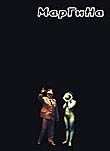|
|
Lexicon of Yu mythology
It is all about memory. In fact, not only about memory, since
the time is multiple, maybe even circle, as a Mebius tape,
overwhelming even the space...
So, many things are connected with the memories of SFRY. Our youth,
of course, our constitutional experiences with the getting familiar
with the world, our formation, in emotional, moral, educational,
political sense...
What is beautiful is that the forming, the constituting, actually,
never stops. The dissolution of Yugoslavia, and our caught in a
completely new social concept, independent Macedonia, meant exactly
further (and it became endless) personal and social constitution
through the vertigos of the recent Balkans history...
Many people lost everything in these vertigos: their own lives,
families, homes, properties, and living places... Their tragedy is
incomparable and irreplaceable...
The surviving majority had to face different loses. One of it is the
loss of the collective memory, which seemed confiscated by the new
nation states.
As Dubravka Ugresic put it, with the dissolution of the
multinational Yugoslavia the process of confiscation of the Yugoslav
collective memory and its substitution with the construction of the
national memory began. The war only speed up the things.
Cultural Guerilla
Political dadaism, consumerist terrorism, cultural subversions,
information warfare, disinformation, semiologic guerilla,
plagianiarism, clowning mockery, piracy, revolutionary shirking,
contra-revolutionary communism, rejecting of art, revolution of
perception - the different forms of cultural terrorism are directed
towards the conquest of the space in the enemy territory worn-out by
the capitalist culture and the polluted media surrounding...
One of the typical examples of such acting is the group Luther
Blissett. The Luther Blissett multiple name project (the name
originally belonged to a British football player) was initiated in
1994 in Italy, and has since then been joined by dozens of
mail-artists, underground reviews, poets, performers and squatters’
collectives in cities throughout Europe. Many of them joined the
project without declaring themselves, invisibly, thus the history
will remain incomplete. Luther Blissett has appeared in reports of
ludicrous sabotages in Norway and Finland, in Hungary in a press
campaign organized by a neoist for the liberation of a US political
prisoner with the same name, in France in a collection of love
letters to an unknown lady. In Slovenia, Luther Blissett wrote a
manifesto called “10 Items of the Covenant.” In Italy, Luther
Blissett organized dozens of situationist assaults against the
establishment, as well as situationist assaults against the
establishment of situationism.
Macedonian drawings -
As part of the project Confluent Margins in Negotino we set up
an exhibition of 12 young Macedonian artists: Macedonian drawings -
new tendencies. In this exhibition were included following authors:
In Margina we represent small catalogue of the displayed artist with
2 drawing from each of them.
Those young authors will be exhibited in several cities all over the
country.
James Graham Ballard
We publish the first three chapters of the last novel by the
contemporary English writer James Graham Ballard Millennium People.
According to the critics, Millennium People is continuation of the
issues elaborated in his two previous novels Cocaine nights and
Super-Cannes. Maybe the New Statesman, John Gray, gives the most
precise picture about the novel when he says that: “Ballard’s vision
of the world is unsurpassed in its clairvoyant exactitude. His
latest dispatch from the near future is as bleak and beautiful as
ever. Seemingly a fable of the euthanasia of the bourgeoisie,
Millennium People dissects the perverse psychology that links
terrorists with their innocent victims. This is news from the near
future, another dispatch from one of the supreme chronicles of our
time.”
As an introduction we present two reviews on the novel by Zulficar
Abbany and Will Self.
Vangel Nonevski
We publish the text of the young Macedonian author, Vangel
Nonevski. The text “East or (and) West?: contribution to the
genealogy of the cultural confrontation” is actually reworked essay
from his graduation on the Faculty of Philosophy in Skopje
University. The author gives several examples on the ideological
reasons (genealogy) why the antagonism between the two global
ideological blocs (East and West) appeared. He is conscious of the
generalization that is made when the two terms Eastern and Western
culture are used, but takes it as an unavoidable theoretical tool.
He gives insight into some of the most characteristic “eastern” and
‘western” views and values which brought to the dichotomy but also
the domination and the subordination of the one culture over the
other.
|

|